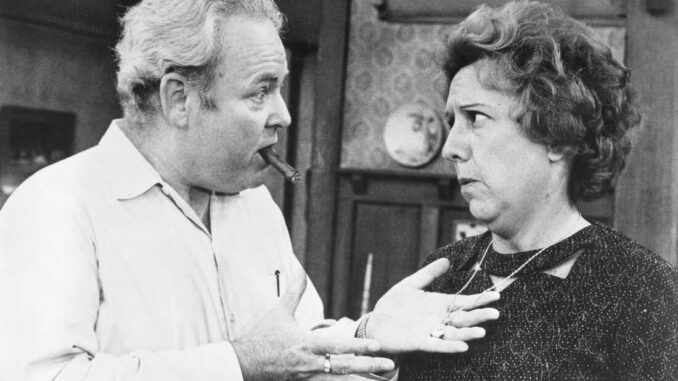
From ‘All in the Family’ to ‘Shameless’ to ‘Succession’ and ‘Billions’: how TV looks at class
Blue collar Archie Bunker was played for laughs while the sitcom husband was subverted in “Kevin Can F**k Himself.” And then there are the ultrarich folks like Bobby Axelrod.
What TV shows are dominating the conversation, capturing the zeitgeist, have something interesting to say, or are hidden gems waiting to be uncovered or rediscovered? This week, in keeping with the theme of the Star’s Culture section, we’re talking about shows that reflect class. And, be warned, there are spoilers ahead.
The first time I remember consciously thinking about class as it related to a television show was when I saw “All in the Family,” which debuted in January 1971, when I was nine.
Its main character, Archie Bunker, was a dock worker living with his wife, daughter and, eventually, son-in-law in Queens, N.Y., but — despite the fact his family, like mine, lived in a house and my father did a job some might consider blue collar — I clocked the Bunkers as being in a lower strata than my own based on the way Archie (Carroll O’Connor) spoke.
Archie, a white, Protestant, Nixon-loving reactionary, uses words for other ethnic and racial groups not permissible on TV today (or really, anywhere) and perpetually puts down his “dingbat” wife, Edith (Jean Stapleton), and his “ meathead” son-in-law, Mike (Rob Reiner).
Although people with more power and money pulled the strings outside the house, Archie was king in his shabby living room, his throne a worn wingback chair (now in the collection of the Smithsonian). He even became a business owner, buying a neighborhood bar in Season 8.
But his success was outstripped by the Black family who moved two houses down — despite Archie’s and his white neighbors’ attempts to keep them out — “The Jeffersons” (1975).
George Jefferson (Sherman Hemsley), a cantankerous Black foil to Archie, parlayed his dry-cleaning business into a swanky apartment on New York’s Upper East Side in the “All in the Family” spinoff. The Jeffersons had “moved on up,” as the famous theme song said, from Harlem to Queens and then to Manhattan where George was eager to adopt signifiers of wealth like a maid, despite the discomfort of his wife, Louise (Isabel Sanford), a former maid herself.

There’s an irony to the fact that, despite “The Jeffersons” being a rare TV portrayal at the time of an upper middle class Black family succeeding despite white racism, CBS didn’t bother to alert the previous cast when the show was canceled after 11 p.m. seasons, two longer than “All in the Family” lasted. They reported learned about it from newspaper reports; there was no opportunity for a series finale.
In 2011, a TV family hit screens in which any thought of upward mobility seemed a pipe dream: the Gallaghers of “Shameless.”
Single father Frank (William H. Macy) spent most of his disability checks on booze or drugs while the oldest of his six children kept the family afloat, either through legitimate jobs or theft. The family home on the South Side of Chicago was chaotic — if Frank wasn’t missing, he was likely passed out on the floor somewhere — but relatively comfortable despite the family’s poverty.
When the show ended, the kids were fatherless, at least two of them were facing a life of continued poverty, possibly even infertility, and one a life of crime. For instance, son Lip (Jeremy Allen White, who went on to “The Bear”) was smart enough to be accepted into MIT, but had a girlfriend and son he was struggling to support, another child maybe on the way and a younger brother to care for.
But Frank, in his unsentimental last words to his family, figured they’d all get by.
While Archie and George’s characters in the 1970s were played for laughs, the trope of the husband as sitcom buffoon was subverted in the dark two-season drama “Kevin Can F**k Himself” (2021).
Kevin (Eric Petersen) was a stereotypical multi-cam comedy protagonist, a beer-guzzling blue collar worker spouting laugh-tracked one-liners and engaging in self-aggrandizing schemes. But the cost of his jocularity was made clear when wife Allison (Annie Murphy of “Schitt’s Creek”) got so fed up she plotted Kevin’s murder.
Kevin and Allison lived in a rented house in Worcester, Massachusetts, and Allison worked at a liquor store on a tired looking commercial strip while Kevin was a cable installer.
Her aspirations for a better life were expressed in material ways: the red lip tint she bought at an upscale cosmetics store; the prized Pottery Barn coffee table she found at Goodwill; the house she wanted to buy, which she pictured in a recurring fantasy of herself in a pretty dress in a shiny new kitchen pouring beer for a blazer-and-dress-shirt-clad Kevin.